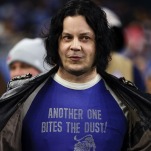First things first: Selfie has a lot of problems. It’s hard to judge a show based on just the pilot, and harder still with a sitcom like Selfie, which is trying to establish months of backstory in a few short strokes. But all the caveats in the world can’t hide the fact that Selfie is mess—much like its protagonist, Eliza Dooley, played by Scottish actress Karen Gillan attempting an American accent. The point of the show is that Eliza is a problem. Where Selfie gets confused, very quickly, is in determining exactly how Eliza is a problem. At least part of it is that she has “loose sexual morals,” which in sitcomland is somehow considered a character flaw. Some other part of it is that Eliza is always on her phone; a third part is that she doesn’t ask people in her office how well they slept the night before; a fourth is that she seems to care about looking good.
Selfie is so eager to paint Eliza as the laughable idiot of the show that it quickly becomes outright offensive, making broad assumptions about people who spend a lot of time on the Internet or dress well or want to have sex with men. And by people, I mean “women”; Selfie spends a lot of its pilot episode focused on a man telling a woman the many ways in which she has erred against the patriarchy. In fact, Henry, the man in question, creates an impromptu spoken-word rhyme just to belittle Eliza’s choices as much as possible. (You know, like the rain in Spain.)
Selfie is funny, but it’s oddly unsympathetic towards its main character. What Selfie should be is the TV version of Legally Blonde, except, you know, Internet Redhead. But no: Instead of Elle Woods’ charmed success, viewers of Selfie watch as a man tells a woman that all the things women are told to do, daily, by advertising and the media and men and other women, are wrong, and make her a bad person. This, even though Eliza is introduced as the best employee in sales—surely self-absorption is a useful quality when shilling nasal spray? The way she’s treated in Selfie is so obviously patronizing and unnecessarily shaming that it’s tempting to write off the whole show as half-baked.
Weirdly, though, Selfie has a lot of potential, and that comes primarily in the form of Gillan, who won’t let the show browbeat and patronize her quite that much. Her Eliza is sharp and vulnerable, pretty and messy, clueless and cued-in, and as a result she is a lot of fun to watch. She’s modeled on George Bernard Shaw’s Eliza Doolittle, whose My Fair Lady incarnation was interpreted on the stage and then the screen by Julie Andrews and Audrey Hepburn, respectively. And though she doesn’t have the cockney accent (more’s the pity), she’s got the slapdash charm of her predecessors. A lot of Selfie’s capacity for success lives and dies on Gillan’s ability to sell her character, and though the pilot is scattered, she works, even when her own voiceover is berating her for some perceived slight.
The rest of the success comes from Gillan’s co-lead, John Cho, who plays the the Pygmalion to her Galatea—named Henry, of course. And though Henry gets to play the part of the stuffy status quo in the pilot, by the end of it, the pilot undercuts his personality a bit. Just a smidge, really—his ex-girlfriend called him “un-fun” on his blog, and he doesn’t call his mom enough—but it’s enough that Selfie begins to morph from a top-down transformation story into a show that could be about a particular relationship where both members are attempting to be better people.
The pilot was cut and re-cut, in the past few months, so that it might land better. The show’s producers, much like its critics, seem to see that there’s potential buried in there, but aren’t totally sure how to draw it out. Cho and Gillan together on screen is one huge strength—the two have chemistry, albeit hate-chemistry, and if there’s a potential romance there, the pilot dials it down to grudging mutual acceptance, which is more than enough for a first episode. As rushed as the first few minutes are, with superfluous voiceovering and rapid exposition, you can forgive the show for wanting to get Cho and Gillan on screen together as quickly as possible.
There’s also a lot of potential in the show’s visual feel, which is one of the smartest portrayals of social media on television. Eliza’s face is framed by her own Instagram filter at some point; text messages from her iPhone pop up on-screen, accompanied by the standard Unicode emoji we all know and love. And that sharp awareness of the trappings of this world come into play in the sound effects and even Eliza’s own speech patterns (“I threw up hard. I don’t know if you have ever thrown up that hard, hashtag the struggle, but…”). After hundreds upon hundreds of shows that introduce cheap effects instead of what we all know phones look and sound like, it’s refreshing to see that a show has made the effort to obtain the rights and follow through with the details. Selfie is actually just fun to watch, because it has a lot of colors and flashing things, and look, sometimes that’s all you need to stop flipping through channels.
Selfie is the brainchild of Emily Kapnek, whose Suburgatory was cancelled at the end of last season. If there’s a common thread between the two shows, it’s primarily that the humor is sort of kooky—a group of women who don’t much know each other starting to sing Lady Gaga’s “Bad Romance,” accompanied by a ukulele, is so the type of thing that would have happened on Suburgatory. And much like that show, there’s something a bit uncomfortable about the humor—it makes some sweeping generalizations and quick assumptions, and while that does yield laughter, it’s usually of the uncomfortable variety.
But it is also darkly sort of brilliant as a commentary on social media. And if Selfie can focus more on the pair of characters growing up together instead of Eliza’s perceived flaws, it’ll be a better show. (It could also dial it down with the cute pop songs inserted into the production every few minutes. Light and upbeat, we get it!) It looks right now like the show is going to spend some time trying to make the ensemble thing work (with David Harewood and Allyn Rachel and Da’Vine Joy Randolph filling out hastily sketched roles) while spending as much time as possible making Karen Gillan look cute while wearing not that much clothing. But once it gets that out of its system, maybe we’ll have something worth watching on our hands.
Stray observations:
- Everything else aside, Gillan’s line delivery is perfect. Excellent use of the ellipsis. Such as…
- “Don’t be jelly, Linda.”
- “… like Gwyneth Paltrow.”
- “Plus-sized skinny jeans. It’s like… why?”
- “That wedding gave me feels.”
- Meanwhile, in the elevator: Bryn’s book club is reading Fear Of Flying and the show, not content with the cultural reference at the center of its premise, wants to make some parallels between Eliza and Erica Jong. Here for it, but not optimistic that they’re going to land that particular flight, hashtag the struggle.






![Rob Reiner's son booked for murder amid homicide investigation [Updated]](https://img.pastemagazine.com/wp-content/avuploads/2025/12/15131025/MixCollage-15-Dec-2025-01-10-PM-9121.jpg)
























![HBO teases new Euphoria, Larry David, and much more in 2026 sizzle reel [Updated]](https://img.pastemagazine.com/wp-content/avuploads/2025/12/12100344/MixCollage-12-Dec-2025-09-56-AM-9137.jpg)









